Then, in such hour of need
Of your fainting, dispirited race,
Ye, deg. like angels, appear,
190
Radiant with ardour divine!
Beacons of hope, ye appear!
Languor is not in your heart,
Weakness is not in your word,
Weariness not on your brow.
195
Ye alight in our van! at your voice,
Panic, despair, flee away.
Ye move through the ranks, recall
The stragglers, refresh the outworn,
Praise, re-inspire the brave!
200
Order, courage, return.
Eyes rekindling, and prayers,
Follow your steps as ye go.
Ye fill up the gaps in our files,
Strengthen the wavering line,
205
Stablish, continue our march,
On, to the bound of the waste,
On, to the City of God. deg.
deg.208
* * * *
*
[149]
NOTES
* * * * *
SOHRAB AND RUSTUM
“I am occupied with a thing that gives me more pleasure than anything I have ever done yet, which is a good sign, but whether I shall not ultimately spoil it by being obliged to strike it off in fragments instead of at one heat, I cannot quite say.” (Arnold, in a letter to Mrs. Foster, April, 1853.)
“All my spare time has been spent on a poem which I have just finished and which I think by far the best thing I have yet done, and I think it will be generally liked; though one can never be sure of this. I have had the greatest pleasure in composing it, a rare thing with me, and, as I think, a good test of the pleasure what you write is likely to afford to others. But the story is a very noble and excellent one.” (Arnold, in a letter to his mother, May, 1853.)
The following synopsis of the story of Sohrab and Rustum the “tale replete with tears,” is gathered from several sources, chiefly Benjamin’s Persia, in The Story of the Nations, Sir John Malcolm’s History of Persia, and the great Persian epic poem, Shah Nameh. The Shah Nameh the original source of the story, and which purports to narrate the exploits of Persia’s kings and champions over a space of thirty-six centuries, bears the same relation to Persian literature as the Iliad and Odyssey to the Greek, and the AEneid to the Latin, though in structure it more nearly resembles Morte d’Arthur, which records in order the achievements of various heroes. In it the native poet Mansur ibn Ahmad, afterwards known to literature as Firdausi, the Paradisaical, has set down the early tales and traditions of his people with all the vividness and color common to oriental writers. The principal hero of the poem is the mighty Rustum, who, mounted on his famous horse Ruksh, performed prodigies of valor in defence of the Persian throne. Of all his adventures his encounter with Sohrab is the most dramatic. The poem was probably written in the latter half of the tenth century. As will be seen, the incidents narrated in Arnold’s poem form but an episode in the complete story of the two champions. [150]




